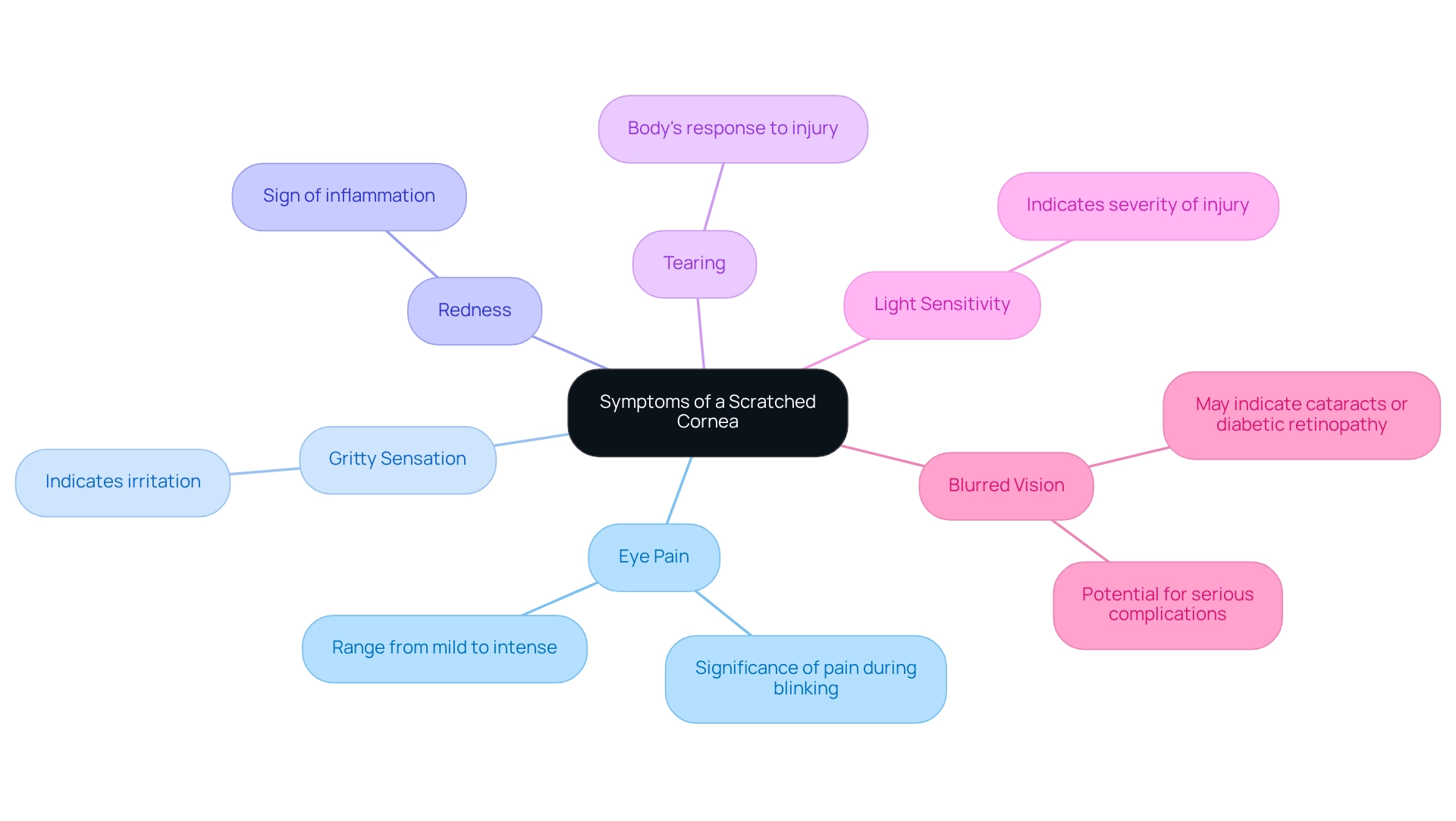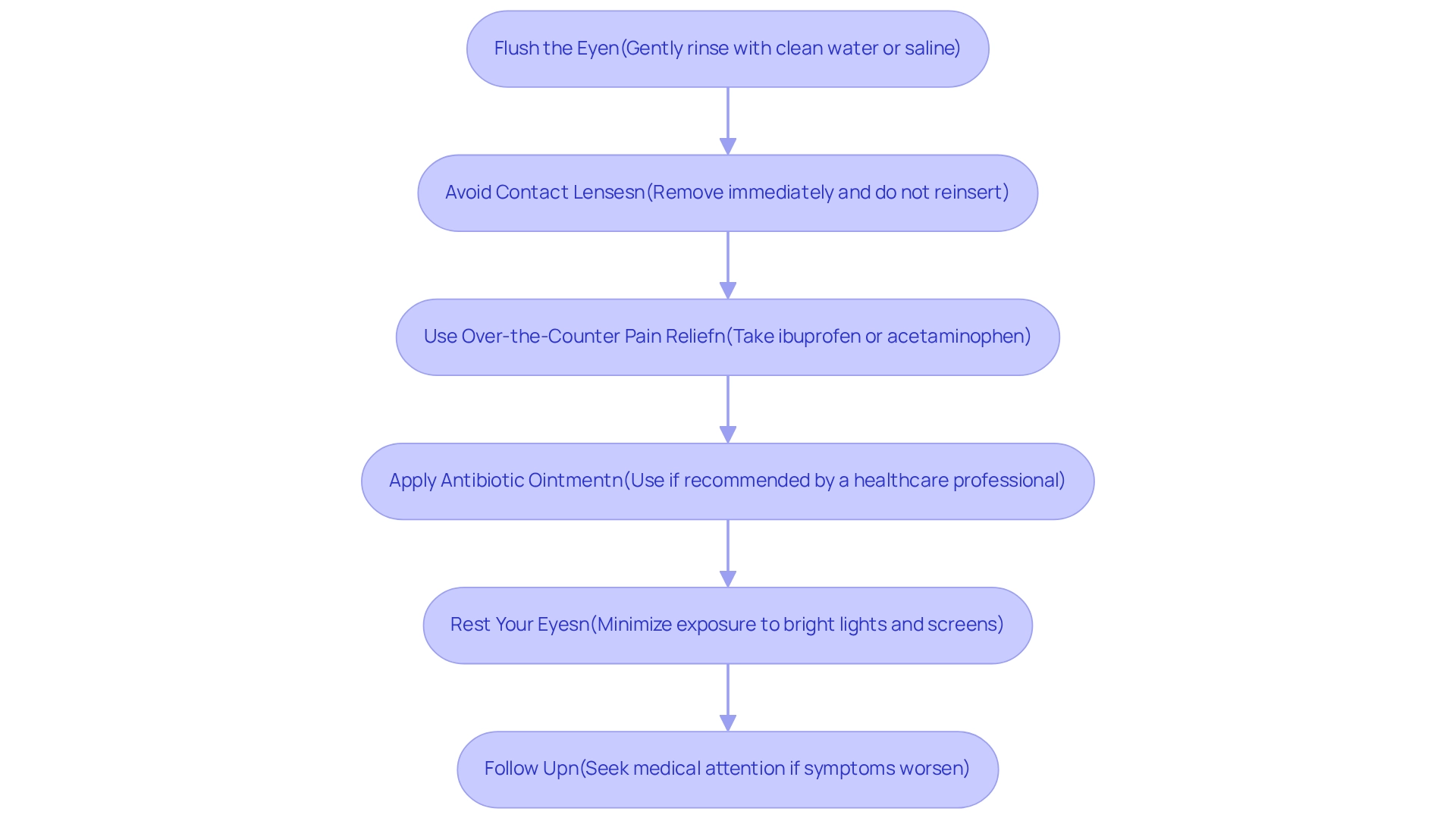Posted by: Northwest Eye in General on May 30, 2025
Overview
If you find yourself dealing with a scratched cornea, we understand how concerning this can be. It’s essential to take the right steps to care for your eye. Start by gently flushing the eye with clean water to remove any irritants. Please remember to avoid wearing contact lenses during this time, as they can worsen the situation.
You may also consider using over-the-counter pain relief to help manage any discomfort. If necessary, applying antibiotic ointment can be beneficial, but we encourage you to consult with a healthcare professional first. Resting your eyes is crucial for recovery, and it’s important to monitor your symptoms closely. If you notice any worsening conditions, don’t hesitate to seek further medical advice.
Prompt and appropriate care is vital to prevent complications and ensure proper healing. We want you to know that untreated corneal abrasions can lead to serious issues, including infections and potential vision loss. Your well-being is our priority, and we are here to help you through this process.
Introduction
In the realm of eye health, a scratched cornea, or corneal abrasion, is a common yet often underestimated injury that can significantly impact your vision and overall well-being. We understand that this injury can arise from various causes, including:
- Foreign objects
- Physical trauma
- Misuse of contact lenses
Recognizing the risks associated with corneal abrasions is essential for prevention and prompt treatment.
As symptoms such as intense pain, light sensitivity, and blurred vision emerge, it’s common to feel anxious about when to seek medical attention. Recognizing these signs early is critical to avoiding long-term complications. This article delves into the causes, symptoms, treatment steps, and the importance of timely medical intervention. We are here to help you safeguard your eye health and ensure a swift recovery from this prevalent injury.
Understand the Causes of a Scratched Cornea
A scratched cornea, which is medically referred to as a corneal abrasion, can result from various common causes.
- Foreign Objects: Particles such as dust, sand, or small debris are frequent culprits, particularly during outdoor activities. We understand that dealing with eye injuries can be alarming. Statistics indicate that up to 30% of patients with eye foreign bodies sought treatment outside of regular hours, highlighting the urgency of addressing such injuries. Delayed treatment can lead to complications, emphasizing the need for prompt care.
- Physical Trauma: Accidental contact from fingers, makeup brushes, or branches can result in scrapes. It’s common to feel surprised when these incidents occur unexpectedly, underscoring the importance of being cautious in everyday situations.
- Contact Lenses: The chance of eye surface injuries greatly rises with the use of extended-wear contact lenses. We know that improper handling or damage to these lenses can result in a scratched cornea, necessitating careful maintenance and usage. As Dr. Arun Verma, MD, notes, “In some patients, induced corneal swelling can be sufficient to cause corneal bullae, which may rupture, leading to epithelial defects.”
- Chemical Exposure: Exposure to certain chemicals can irritate the eye and lead to a scratched cornea if they come into contact with it. Awareness of potential hazards in both household and outdoor environments is crucial for prevention.
Comprehending these factors enables individuals, especially cataract patients, to take proactive steps to protect their eye health and minimize the chance of harm. The cornea plays a vital role in focusing light onto the lens and filtering damaging UV light from the sun, which is essential for maintaining . Expert opinions indicate that upholding suitable eye care habits and being attentive during activities can greatly reduce the chances of eye injuries.
Furthermore, the outlook for eye injuries differs greatly depending on the kind and intensity of the injury. We want you to know that slight scrapes typically result in a favorable outcome, whereas serious injuries might cause long-lasting complications. Remember, we are here to help you through this process.
Identify Symptoms of a Scratched Cornea
Recognizing the symptoms of is important as they can significantly impact your daily life. You may experience:
- Eye Pain: This can range from mild discomfort to intense pain, especially when blinking. Many patients report this pain due to a scratched cornea on the outer layer of the eye, which can lead to a gritty sensation, redness, tearing, light sensitivity, and blurred vision. Blurred vision can also indicate other issues, such as cataracts or diabetic retinopathy, which are often addressed at Northwest Eye. We understand that identifying these signs is essential, as untreated eye injuries, like a scratched cornea, can lead to serious complications, including bacterial keratitis and scarring that could result in permanent vision loss. For serious eye injuries, a doctor may need to remove the foreign object from your eye. Prompt treatment and follow-up care are crucial to ensure proper healing and to prevent further issues. If you are experiencing any of these symptoms, we are here to help you through this process. We encourage you to schedule an appointment with a Northwest Eye doctor for a thorough examination.

Follow Treatment Steps for a Scratched Cornea
To effectively treat a scratched cornea, we recognize that it can be a troubling experience. Please follow these steps to help you on your healing journey:
- Flush the Eye: Gently rinse your eye with clean water or a saline solution to eliminate any foreign particles. It’s crucial to avoid rubbing your eye, as this can exacerbate the injury.
- Avoid Contact Lenses: If you wear contact lenses, please remove them immediately and refrain from reinserting them until your eye has fully healed. This helps prevent further irritation and potential complications.
- Use Over-the-Counter Pain Relief: Non-prescription pain relievers, such as ibuprofen or acetaminophen, can effectively manage discomfort related to a scratched cornea. Prompt treatment is essential to prevent a scratched cornea and other permanent damage to the eye. As Chirag R. Patel, M.D., emphasizes, ‘Prompt treatment is necessary to prevent a scratched cornea and permanent damage to the eye.’
- Apply Antibiotic Ointment: If recommended by a healthcare professional, use antibiotic eye drops or ointment to minimize the risk of infection, especially in instances of deeper scratches.
- Rest Your Eyes: Minimize exposure to bright lights and screens to alleviate strain on your eyes. Wearing sunglasses can help manage light sensitivity during the healing process.
- Follow Up: Keep track of your symptoms. If they worsen or do not improve within 3 to 5 days, please seek medical attention. It’s important to understand the significance of follow-up treatment and protective actions to ensure the best recovery. Remember, individuals with generally heal fully within this timeframe.
In instances of repeated epithelial erosions, which can happen in individuals with a history of eye abrasions, ongoing management and education are essential. A case study on corneal erosions highlights the need for patients with corneal dystrophies or dry eye conditions to be aware of their risks and treatment options. By following these steps and understanding the importance of proper care, you can significantly enhance your recovery and eye health. We are here to help you through this process.

Recognize When to See a Doctor
If you experience any of the following symptoms, we encourage you to seek medical attention promptly:
- Severe Pain: If you are dealing with intense pain that doesn’t improve with over-the-counter pain relief, it’s important to consult a healthcare professional. Severe pain can be a sign of deeper damage to .
- Vision Changes: We understand that sudden changes in vision, such as blurriness or loss of sight, can be alarming. These critical signs require immediate evaluation.
- Persistent Symptoms: It’s common to feel concerned if your symptoms worsen over time, especially if you notice increased redness, tearing, or light sensitivity. These may signal complications that need medical intervention.
- Signs of Infection: Symptoms like increased discharge, swelling, or escalating pain can suggest an infection. Prompt treatment is essential to prevent further complications.
- Foreign Object: If you suspect a foreign object is lodged in your eye, please do not attempt to remove it yourself. Seeking professional assistance is vital to avoid further harm.
Statistics show that being struck by an object accounts for 12.0 percent of eye injury-related emergency department visits leading to admission. This highlights the importance of recognizing these symptoms early. Expert advice emphasizes that addressing severe pain and other alarming signs promptly can facilitate proper healing and prevent long-term damage. As noted by Pamela L Owens, PhD, the leading causes of eye injuries include being struck by an object. This underscores the need for public health initiatives aimed at preventing eye injuries. Remember, timely medical attention is crucial; untreated scratched corneas can lead to serious complications, including infections that may impair your vision. We are here to help you through this process.
Conclusion
Understanding the causes, symptoms, and treatment options for a scratched cornea is vital for maintaining eye health and ensuring a swift recovery from this common injury. We understand that corneal abrasions can stem from various sources, such as foreign objects, physical trauma, improper contact lens use, and even chemical exposure. Recognizing these potential hazards allows you to take proactive measures to protect your eyes.
The symptoms of a scratched cornea, including eye pain, light sensitivity, and blurred vision, can significantly affect your daily life. It’s common to feel overwhelmed by these signs, making prompt recognition essential to prevent complications like infections or permanent vision loss. Seeking medical attention when experiencing severe pain, vision changes, or signs of infection is crucial for effective treatment.
Following appropriate treatment steps, such as flushing the eye, avoiding contact lenses, and using pain relief measures, can facilitate healing. Additionally, understanding when to seek medical help can prevent further complications and ensure optimal recovery. By being informed and vigilant, you can safeguard your eye health and mitigate the risks associated with corneal abrasions. Prioritizing eye care not only enhances your personal well-being but also contributes to long-term visual health. We are here to help you through this process.
Frequently Asked Questions
What is a scratched cornea and what is its medical term?
A scratched cornea is medically referred to as a corneal abrasion.
What are common causes of a scratched cornea?
Common causes of a scratched cornea include foreign objects (such as dust or sand), physical trauma (from accidental contact), contact lenses (especially extended-wear lenses), and chemical exposure.
How can foreign objects lead to a scratched cornea?
Foreign objects like dust, sand, or small debris can enter the eye, particularly during outdoor activities, and can scratch the cornea.
What role do contact lenses play in corneal abrasions?
The use of extended-wear contact lenses increases the risk of eye surface injuries, especially if the lenses are improperly handled or damaged.
How can physical trauma cause a scratched cornea?
Accidental contact from fingers, makeup brushes, or branches can lead to scrapes on the cornea.
What should be done if there is chemical exposure to the eye?
Awareness of potential chemical hazards is crucial, as exposure can irritate the eye and lead to a scratched cornea.
Why is it important to address eye injuries promptly?
Prompt treatment is essential because delayed care can lead to complications. Statistics show that up to 30% of patients with eye foreign bodies seek treatment outside of regular hours.
What is the general outlook for eye injuries?
The outlook varies depending on the type and severity of the injury; minor scrapes usually have a favorable outcome, while serious injuries may lead to long-lasting complications.
How can individuals protect their eye health?
Individuals can protect their eye health by understanding the causes of corneal abrasions and maintaining suitable eye care habits, especially during activities that pose risks.






